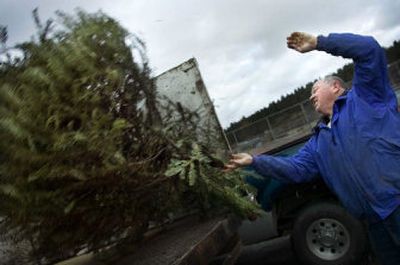Schools, others hoping money does grow on trees

While households across the Inland Northwest wrap up one tradition in the coming weeks by throwing out their Christmas trees, several high schools are gearing up for a tradition of their own.
Tree recycling has become one of the year’s biggest fund-raisers for several school bands and other groups.
“All the marching bands compete, and those trips are expensive,” said Tom Clark, who is organizing tree recycling at University High School.
“This is approximately a third of our fund-raising effort,” he said.
University, Central Valley and West Valley high schools will cooperate in drives at several locations.
Clark said his school hopes to collect about 1,000 trees dropped off for $7 apiece or picked up at homes for $10.
“I think the trees have decreased a little bit,” Clark said.
He attributed a modest decline in drop-offs in recent years to an increase in homes with fake Christmas trees.
Organizers at West Valley also expressed concern over the growing number of non-disposable trees, but couldn’t identify a trend in the number of trees they recycled in years past.
Artificial Christmas trees have gained in popularity. One model that can be hung from the ceiling was especially in vogue this year.
But according to research conducted by the U.S .Department of Agriculture, receipts for live trees have increased in all but one year from 1990 to 2004.
“It looks like a good year this year,” said Bryan Ostlund of the Pacific Northwest Christmas Tree Association.
Fears of labor shortages and higher gas prices after hurricane Katrina were allayed this fall, he said. Those factors and changing patterns in where trees are grown resulted in a year much like 2004 for growers and retailers in the Northwest, Ostlund said.
All of that disposable timber could spell good news for parents at East Valley High School who are raising money for this year’s senior all-night party.
The school hasn’t used tree recycling to raise funds for the party for a couple of years, but it is the first site to open this season.
“We had parents who said, ‘Well, let’s try it,’ ” said Sherrie Potter as she and others helped set up a drop-off point at the school Wednesday afternoon.
In past years, the party has cost about $25,000. Graduation at the school will be on a Saturday this year, rather than a weekday, which will push the cost of renting a party spot even higher, Potter said.
For band members and others at West Valley High School, tree recycling will help them chip away at an even bigger fund-raising goal.
The school is one of ten in the country whose band, color guard and cheerleaders have been invited to the National Cherry Blossom Festival Parade in Washington, D.C., this spring. Once travel expenses for all of the attendees are accounted for, the trip is expected to cost about $120,000.
The tree collection is one of several fund-raisers planned for the excursion and has been a band tradition for six or seven years, said organizer Sharon Weddle.
Students in the program will cover about 75 shifts once recycling starts
“I’d say virtually everyone is working on it,” Weddle said.